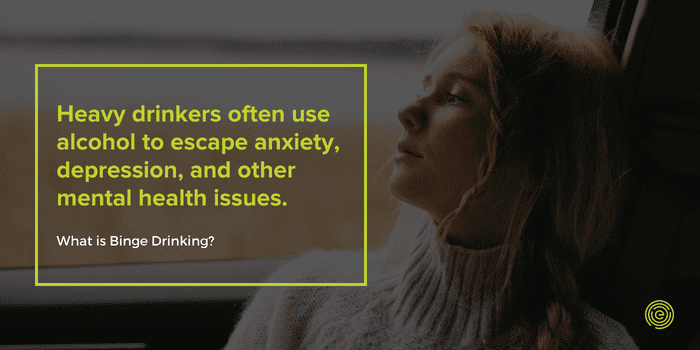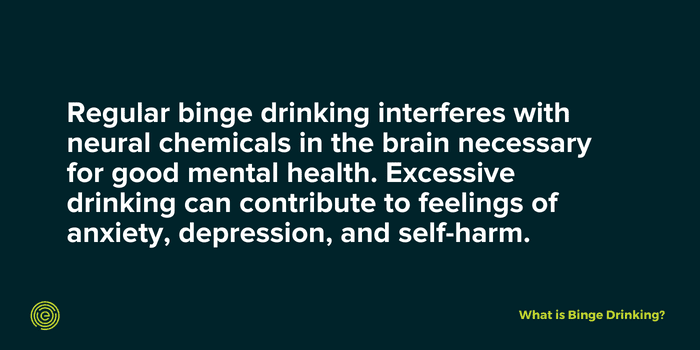When does having a few drinks with friends turn into binge drinking? Or when does having a cocktail after work become a cause for concern? In this story, we will explore binge drinking, its risks and side effects, and how binge drinkers can get help to control their alcohol consumption.
What is Binge Drinking?
A common yet dangerous pattern of alcohol abuse in Canada, binge drinking is a pattern of excessive alcohol consumption within a short period. The Centre for Addiction and Mental Health (CAMH) defines binge drinking as a behavioral pattern in which a person drinks alcoholic beverages within a two-hour period, raising blood-alcohol concentration (BAC) to 0.08% or higher.
BAC represents the amount of alcohol in the blood, and a BAC level of 0.008% means you are legally intoxicated. Blood alcohol absorption rates differ widely within a population, depending on age, sex, and body size.
How Many Drinks Will Cause BAC of 0.0008?
It typically takes five or more standard drinks for adult men and four or more standard drinks for adult women to reach a BAC level of 0.08% within two hours. A standard drink is defined as:
- 43 mL of liquor (1.5 oz.) with 40% alcohol content
- 85 mL of fortified wine (3 oz.) with 18% alcohol content
- 142 mL of wine(5 oz.) with 12% alcohol content
- 341 mL of beer, cider, or cooler (12 oz.) with 12% alcohol content
Research indicates that fewer drinks attain the same BAC content within the same timeframe among young people. It takes three standard drinks for girls and three to five for boys, depending on their age and body size.
According to Statistics Canada’s data from 2018, 19.1% of Canadians above 12 years of age ( approximately 5.8 million) reported alcohol consumption habits that classified them as heavy drinkers.
While binge drinking is a growing concern for all age groups and sexes, there are identifiable trends for the following sub-groups:
Preteens and Teens
While it is illegal to sell alcoholic beverages to minors in Canada, 3.4% of Canadian youth between 12 and 17 are considered binge drinkers. The 2018 Canadian Community Healthy Survey revealed that 25.6% of underaged youth reported consuming alcohol within the previous 12 months. And 37.8% of these did so every month.
Young Adults
This age group makes up the largest percentage of binge drinkers for both sexes. For adults aged 18-34, 33.5% of men and 23.8% of women admitted binge drinking at least once a month. Overall, men were more likely to report binge drinking (23.8% of alcohol consumers) than women (14.2%).
Older Adults
The prevalence of binge drinking among adults is also on the rise. Approximately 10% of men and 5% of women above 65 admit to drinking heavily at least once a month.
Rural Areas
Canadians living in rural areas are more likely to report binge drinking (22.4%) than people living in urban areas(18.4%).
Why do People Binge Drink?
There are plenty of reasons that Canadians provide for their heavy drinking. The most common arguments provided revolve around mental health issues and life stressors. Here are some common reasons offered by binge drinkers:
For Fun
For most people, binge drinking often begins as simply a fun pastime. Taking shots or winding down with a cocktail is a socially acceptable habit. Social drinking can quickly develop into binge drinking.
You may play a drinking game during the college party that causes you to consume large amounts of alcohol within a short period. Teens and adults looking to fit in with various social circles may adopt certain drinking behaviours that increase their risk of binge drinking.
To Deal With Anxiety and Other Mental Health Issues

Heavy drinkers often use alcohol to escape anxiety, depression, and other mental health issues. Certain circumstances in your life, such as divorce, work performance, academics, and the death of a loved one, can push you to binge drink to numb your stress.
Unknowingly Drinking Excessively
Heavy drinkers may sometimes not realize they are consuming excessive alcohol. It may start as a glass of wine, topped up every few minutes until they finish the bottle in one sitting. Such repeated habits, even when alone, can result in binge drinking, which can be dangerous for your health.
What is the Difference Between Binge Drinking and Alcoholism
Although you may drink heavily occasionally, it doesn’t necessarily mean you have a problem with alcohol. Heavy drinkers can partake in large amounts of alcohol within one short sitting but aren’t dependent on alcohol to function as those with an addiction to alcohol are.
Heavy drinkers may take four or five drinks within a two-hour stint every other week, raising the blood alcohol concentration to 0.08% or higher. Alcoholism is considered an alcohol use disorder, with those who are afflicted developing an addiction.
People suffering from alcoholism often portray behaviours similar to those of heavy drinkers. However, people with alcohol addiction are dependent on alcohol and cannot control their use. Binge drinkers can go for weeks or months without alcohol.
Drinking heavily due to mental health issues such as anxiety and depression is often associated with an increased risk of alcohol use disorder. Monitoring the amount of alcohol you consume can help determine if you are a binge drinker.
Binge drinking can have serious health effects, some causing extensive harm to body organs. The dangers can be short-term or long-term, depending on the frequency of excessive alcohol intake. Binge drinking can result in symptoms such as mood changes, memory lapses, and concentration difficulty. These warning signs may point towards controlling your alcohol intake.
What are the Effects of Binge Drinking?
Excessive drinking can have several short-term and long-term effects. Someone who binges on alcohol may experience impaired judgment, nausea, vomiting, and unconsciousness. They may also become less inhibited and reckless when intoxicated.
Over time, binge drinking can increase the risk of severe health conditions such as pancreatitis, liver disease, and certain types of cancer. Binge drinkers are also at a higher risk of developing alcoholism.
What are the Short-Term Effects of Binge Drinking?
You can experience short-term effects whether you regularly participate in binge drinking or do it once. Some of the common aftereffects include:
- Nausea and vomiting
- Blackouts
- Decreased motor coordination resulting in injuries caused by falls, burns, car crashes, or drownings
- The impaired judgment that leads to risky sexual behaviors such as unprotected sex
- Violence
- Miscarriage or stillbirths among pregnant women
- Alcohol poisoning
- Shortness of breath for people with COPD or other respiratory illnesses
- Memory loss
The most severe short-term effect of binge drinking is alcohol poisoning. Dramatic increases in BAC levels can become deadly, requiring immediate medical attention. The signs associated with alcohol poisoning include:
- Irregular breathing
- Loss of consciousness
- Vomiting
- Slowed heart rate
- Dulled or non-existent reflexes
- Seizures
- Blue-tinged or pale skin
- Low body temperature
If you suspect someone has alcohol poisoning, seek immediate medical care.
What to do when Someone Experiences Alcohol Poisoning
Alcohol poisoning happens when excessive alcohol consumption leads to the life-supporting parts of the brain shutting down. These areas of the brain include functions that control breathing, temperature, and heart rate.
Alcohol poisoning generally happens when large amounts of alcohol are consumed quickly in a short amount of time. It is usually caused by consuming alcohol drinks, but can even occur due to the excessive consumption of other ethanol-based products like mouthwash, cough medicine, or even cologne.
So, what do you do if someone you know is experiencing alcohol poisoning?
- Get them medical help immediately: Call 911 or other medical emergency services as soon as possible.
- Keep them awake: Don’t leave the person alone and try your best to keep them awake and alert if possible.
- Give them water: Water will help to keep them hydrated, **however** you should only provide them with water if they are awake, otherwise they could choke.
- Prevent choking: Turn them on their side. This will help them avoid choking if they vomit.
- Keep them warm: Alcohol poisoning can cause low body temperature. Provide them with a warm blanket.
- Talk to them: Let them know why you’re doing the things you’re doing. Some that suffer from alcohol poisoning may become belligerent. This helps to ease tension.
Stay with the person suffering from alcohol poisoning until emergency services arrive. Alcohol poisoning can be a terrifying experience for all parties, so having someone help to keep them safe and alert can go a long way.
What are the Long-Term Effects?
Individuals who binge drink repeatedly may suffer from long-term health effects. The following are some of the side effects of repeated binge drinking:
Brain Damage
Exposure to heavy volumes of alcohol over extended periods can cause structural changes in the brain, affecting memory, depth perception, and spatial navigation.
Liver Damage
Research has well established that alcohol damages hepatocytes and impairs the liver cells’ ability to repair themselves. There are increased risks of alcohol-induced liver damage such as cirrhosis.
Cardiovascular Disease
People with repeated binge drinking episodes may develop cardiovascular complications such as high blood pressure. Additionally, excessive alcohol intake can increase the risk of heart attacks or stroke.
Fetal Alcohol Spectrum Disorders
Any amount of alcohol during pregnancy is unsafe for the fetus. Children with FASD may have lower birth weights, poor memory, speech and language delays, and small head sizes, among other side effects.
Excessive Weight Gain
Binge drinking may contribute to excessive weight gain due to altered eating habits when intoxicated.
Increase Risk of Developing Certain Cancers
Alcohol is a carcinogen. Extended exposure to alcohol can increase the risk of developing cancers of the mouth, pharynx, rectum, colon, esophagus, and breast (in females).
Mental Health Issues
Regular binge drinking interferes with neural chemicals in the brain necessary for good mental health. Excessive drinking can contribute to feelings of anxiety, depression, and self-harm.
Alcohol acts as a stimulant when first ingested, making users feel more at ease. However, the relaxed feeling is short-lived. As the BAC levels rise past 0.05%, the stimulant effects start to wane as the depressant properties emerge.
Alcohol affects the production of the neurotransmitter gamma-aminobutyric acid (GABA), slowing down the brain’s activity. The neurological effects can lead to depressive episodes filled with anxiety.
Alcohol can cause users to lose their inhibitions and behave impulsively. The drinker may take actions they might not have otherwise taken, including self-harm or suicide. Extremely high levels of BAC can induce psychosis, leading to hallucinations and delusions of self-harm.

Quality of Life
The effects of binge drinking go beyond health complications. Frequent alcohol use can reduce the quality of your life. It may lead to a strained relationship with family, friends, and the workplace.
Living with a spouse who binges on alcohol regularly can lead to violent physical altercations due to impaired judgment. Additionally, driving while intoxicated increases the risk of car crashes and the severity of the resulting injuries.
The depressive effects of heavy drinking may result in the user gradually withdrawing the society. You may spend less time on activities you previously enjoyed, preferring to spend time with other binge drinkers. The behavioral change can further worsen the isolation and your depressive state.
Economic and Social Impacts
Binge drinking has far-reaching economic and social costs. The Canadian Centre on Substance Use and Addiction estimates the total cost attributable to alcohol consumption in Canada is over $16.63 billion annually. This figure is the highest for all abused substances.
Healthcare costs associated with conditions arising from binge drinking are $5.43 billion, with over 105 million inpatient hospitalization incidences. Heavy drinking is also associated with over $6.74 billion in lost productivity.
Socially, alcohol results in a high criminal incident count, with over 250,000 reported cases and nearly $3 billion spent on alcohol-related policing and court costs.
How to Stop Binge Drinking?
Individuals wishing to stop their binge drinking behavior have various options they could try. The effectiveness of the strategies may depend on how well you can control your alcohol intake. Some of the measures you can take include:
- Know your limits, and don’t go above them even when urged by others
- Eat before your drink as it may reduce the amount of alcohol that you consume
- Find a way to count your drinks, such as having bottle caps for your beer bottles in your pocket
- Space out your drinks, don’t chug
- Plan the exact amount of alcohol you intend to take before heading out
- Consider quitting alcohol altogether
- Seek treatment from a certified physician
- Attend therapy sessions to mend any strained relationships that arose from your alcohol abuse
Staying in control of your binge drinking can avoid unnecessary confrontations and accidents common among heavy drinkers. You may experience withdrawals while on your sobriety journey.
Ready to Take the First Step Toward Recovery?
Find out more about our program to see if it’s right for you or someone you know. Call us at 1-866-335-4486 or fill out our admission form to receive help for your binge drinking problem.




